Fluorescence-Activated Droplet Sorting (FADS) Technology
- Home
- EnzymoGenius™ Technology
- Fluorescence-Activated Droplet Sorting (FADS) Technology
































Fluorescence-Activated Droplet Sorting (FADS) is a microfluidic-based, high-throughput screening technology that is extensively employed in the directed evolution of enzymes and strain selection. The working principle of FADS technology is similar to fluorescence-activated cell sorting (FACS), which detects the fluorescent signal in each droplet to achieve the screening and sorting of target droplets. In FADS systems, droplets usually contain a lysis reagent, a fluorescent substrate, and microbial cells that overexpress a mutant of the target enzyme. After sorting, the DNA in the positive droplets can be amplified and analyzed through sequencing to determine the main variant types and abundances.
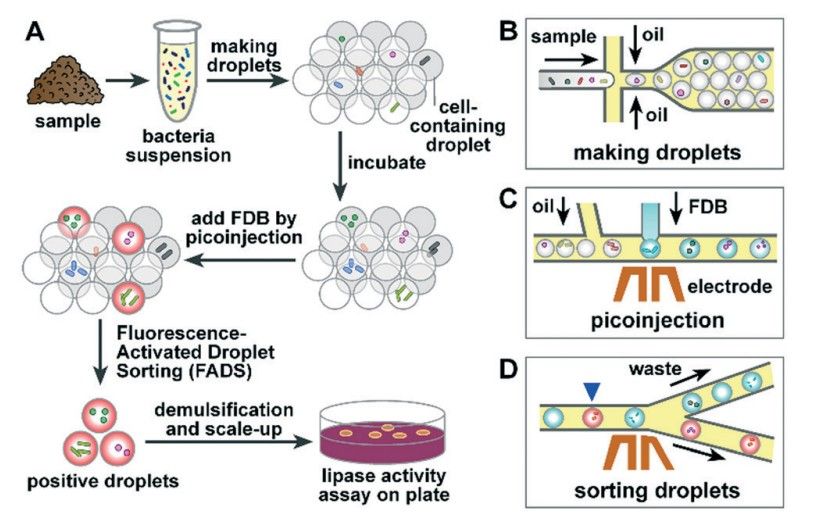 Fluorescence-Activated Droplet Sorting (FADS) Technology(Y Qiao, et al., 2018)
Fluorescence-Activated Droplet Sorting (FADS) Technology(Y Qiao, et al., 2018)
FADS technology has ultra-high throughput, high sensitivity and wide applicability, and can process complex samples such as cell secretions and enzyme reaction products. In addition, the FADS platform can achieve high-precision sorting of multiple fluorescently labeled cells by integrating serial and parallel sorting principles, with an accuracy rate of 99.9%. This technology is not only suitable for the field of life sciences, but can also be applied to multi-fluorescent labeling research in many fields such as environmental science.
Due to its high efficiency, sensitivity and versatility, FADS technology has become an indispensable and important tool in modern biotechnology research, providing strong technical support for enzyme directed evolution, metabolic engineering and single cell analysis.
As an emerging microfluidic screening technology, FADS (Fluorescence Activated Microdroplet Sorting) technology has several significant advantages.
Ultra-high throughput
FADS technology enables ultra-high throughput screening, processing at least 10,000 strains carrying a single unique genotype per hour, which is 100 times higher than traditional microplate screening methods. In addition, the FADS device is capable of producing thousands of droplets per second and sorting them at a rate of hundreds of droplets per second.
High sensitivity and low false positive rate
FADS technology has extremely high sensitivity during the screening process and can detect very low concentrations of fluorescent signals, such as 2.5 nM fluorescein. At the same time, it can also effectively enrich highly fluorescent droplets, making false positive rates below 0.0012 to 0.0029
Wide application range
FADS is not only suitable for sorting signals inside cells, on cell surfaces and secreted outside cells, but also for screening cell-free systems. In addition, it can also be used to screen secretory enzymes and microbial strains
High integration and easy operation
FADS equipment has the characteristics of high integration and easy operation, supports multi-channel fluorescence detection, and has good stability.
Reduce reagent consumption and costs
Compared to traditional FACS, FADS equipment has lower infrastructure, labor and consumables costs. In addition, FADS equipment provides a cheaper alternative than traditional FACS, accelerating the research process
Efficient sorting capabilities
FADS technology enables efficient single-cell resolution and targeted screening, such as quickly building promoters with the required strength in droplets. In addition, FADS can achieve single-cell droplet purity of more than 90%.
Strong anti-interference
In strong interference environments, the FADS system can still maintain high fault diagnosis accuracy and anti-interference capabilities.
The following are the primary applications of the Fluorence-Activated Droplet Sorting (FADS) Technology our company offers:

Rapid screening
FADS technology supports high-throughput screening using ultra-high throughput screening (eg, screening for enzyme variants that play specific roles in directed evolution).
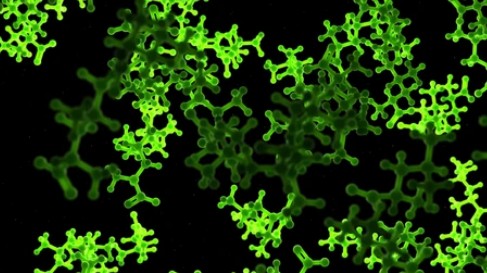
Single cell detection
By sealing individual cells into microdroplets, FADS can detect single cell reactions, including PCR.
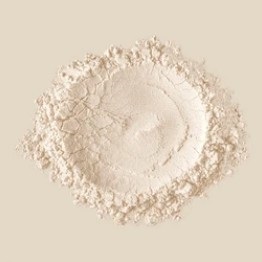
Screening enzyme activities
FADS allows the identification of microorganisms or enzyme versions with known enzyme activities, making industrial enzymes more useful in their applications.
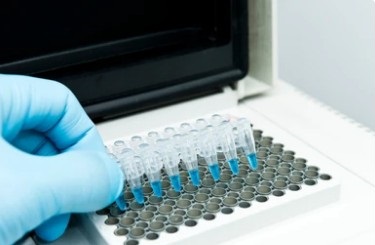
Cell secretions and cell-to-cell interactions
FADS can be used to study cell secretions and cell-to-cell interactions, including immune cell activation.
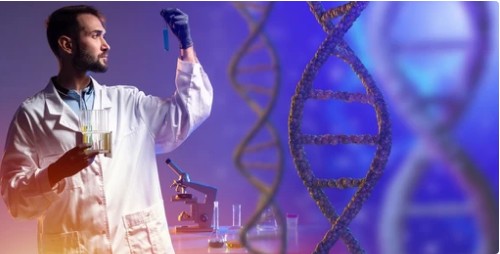
Synthetic biology/biotech
In synthetic biology, FADS can be used for directed evolution, to find nucleases with targeted properties.
Q: What is FADS technology?
A: FADS (Fluorescence Activated Drop Sorting) is an ultra-sensitive microfluidic cell sorter, essentially the same type of sorter as FACS but designed to sort single cells or molecules packed in droplets of water-in-oil emulsion. This technology allows the emulsion droplets to be sorted at superfast rates (2000 drops/second), resulting in fast, high throughput screening.
Q: What are the application areas of FADS technology?
A: FADS technology is widely used in enzyme directed evolution, single cell analysis, metabolic engineering and other fields. For example, in enzyme directed evolution, screening efficiency can be significantly improved by encapsulating enzyme libraries in emulsion droplets for high-throughput screening. In addition, FADS can also be used for high-precision sorting and distribution of single cell reactions.
Q: What are the advantages of FADS compared with other microfluidic sorting technologies?
A: Compared to traditional FACS, FADS has higher throughput and lower cost. For example, FADS can maintain a link between genotype and phenotype in individual droplets, allowing scientists to screen enzyme-encoding genes in droplets at extremely high speeds. In addition, FADS can also achieve multiple sorting, that is, the multi-color fluorescently labeled population is sorted to different outlets at the same time.
Q: How does FADS technology perform in practical applications?
A: In practical applications, FADS technology has proven its efficient screening capabilities. For example, in synthetic biology, FADS technology can be used to efficiently screen nucleases with customized characteristics. In addition, FADS is also used for high-throughput screening of environmental bacteria, which can distinguish between bacteria with different growth rates.
Q: How does FADS technology differ from other droplet sorting technologies?
A: Compared to other droplet sorting technologies, such as AADS (Absorption Activated droplet sorting), FADS has higher processing speed and sensitivity. However, AADS requires larger droplet volumes in some cases due to its lower sensitivity.
Q: What are the application limitations of FADS technology?
A: Although FADS technology is very powerful, its application is limited by whether the target enzyme can produce a fluorescent signal. The catalytic reactions of many enzymes do not produce fluorescent signals, which limits the scope of application of FADS technology.
Q: How to improve the throughput of FADS technology?
A: In recent years, FADS processing speeds have increased from 2,000 times per second to 30,000 times per second by improving equipment design and algorithms. In addition, the use of index-matching oils and methods to eliminate side scattering can improve signal quality, further improving flux.
Q: Is the operation of FADS technology complex?
A: While older FACS (fluorescence-activated cell sorting) machines are expensive to run, newer FADS machines tend to be more simple and cost-effective to run in less-than-ideal conditions.
Q: What are the main challenges facing FADS technology?
A: Although FADS technology has many advantages, it still faces some challenges. For example, existing equipment is sensitive to flow rate fluctuations, which may affect sorting accuracy. In addition, although FADS technology has made significant progress, there is still a need to further improve its throughput and sensitivity in some cases.
Please take a moment to fill out the form.
CD Biosynsis
Copyright © 2025 CD Biosynsis. All rights reserved.
